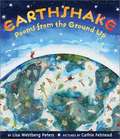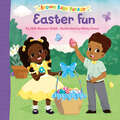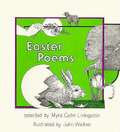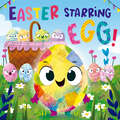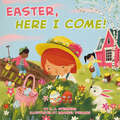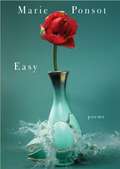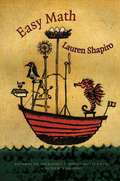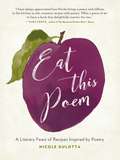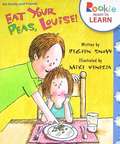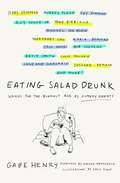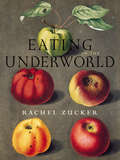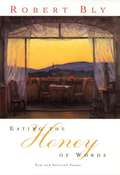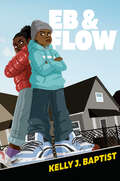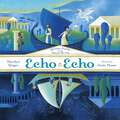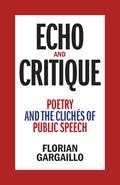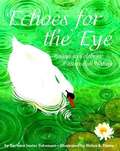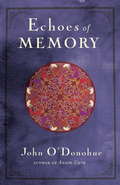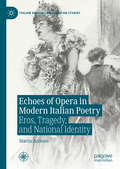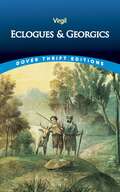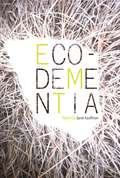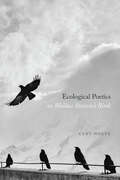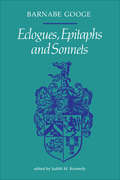- Table View
- List View
Earthshake: Poems from the Ground Up
by Lisa Westberg PetersMaybe that plain old rock has gleaming jewels inside. Maybe Africa and South America used to be best friends. Maybe a clam that died 300 million years ago is in your backyard. What secrets is Earth hiding? These twenty-two poems leave no stone unturned in exploring the world's natural wonders. Crack this book open and watch geology sparkle.
Easter Fun: A Brown Baby Parade Book (Brown Baby Parade)
by Nikki Shannon SmithIt&’s time for some Easter fun! Read along as a young girl spends Easter Sunday with her family in this next installment of the Brown Baby Parade board book series that's perfect for ages 0-3.I quickly spy a pink egg.But guess what? There are more!We have to keep on hunting,much harder than before.A little girl and her family celebrate Easter by visiting loved ones, eating a special meal, and going on an Easter egg hunt.Nikki Shannon Smith's bouncy, rhythmic text and Ashley Evans's vivid, welcoming illustrations pair beautifully to create heartwarming scenes of everyday life. The joyful depiction of a Black family celebrating Easter traditions together will allow children to relate no matter how they celebrate!
Easter Poems
by Myra Cohn LivingstonEspecially commissioned original poems by Felice Holman, William Jay Smith, X. J. Kennedy, Joan Aiken, John Ciardi, and other contemporary poets, as well as traditional favorites, comprise this stunning anthology. From "lopeared and silky" rabbits to the "three crosses on cold Golgotha Hill," Mrs. Livingston's choices reflect the many moods of Easter. John Wallner's fitting illustrations capture both the joy and solemnity of the holiday. Descriptions of illustrations have been included.
Easter Starring Egg!
by Cynthia PlattOthers may get picked first at the Easter egg hunt, but Egg has sparkle on the outside, confidence on the inside, and the patience to wait for his perfect kid. The big Easter egg hunt may be a time to hide, but Egg wants to stand out! Fancied up for his big rendezvous with the perfect kid, Egg knows deep down in his yolk that a special friendship is about to be hatched with the kid who will see him for him.
Easter, Here I Come! (Here I Come!)
by D.J. SteinbergCelebrate Easter with a collection of funny and festive poems from the author of our hugely popular Kindergarten, Here I Come!D. J. Steinberg is back with more playful poems, and this time, they are all odes to Easter and springtime. From making an Easter bonnet to enjoying an egg-squisite Easter brunch, this book is a perfect gift to put in any child's Easter basket!
Easy
by Marie PonsotLeave it to the graceful Marie Ponsot, now in her late eighties, to view her life in poetry as easeful. As she tells us, pondering what stones can hear, "Between silence and sound / we are balancing darkness, / making light of it." In this celebratory collection, Ponsot makes light, in both senses, of all she touches, and her pleasure in offering these late poems is infectious. After more than a half century at her craft, she describes her poetic preferences unpretentiously thus: "no fruity phrases, just unspun / words trued right toward a nice / idea, for chaser. True's a risk. / Take it I say. Do true for fun." Ponsot is accepting of what has come, whether it's a joyous memory of her second-grade teacher in a New York public school or the feeling of being "Orphaned Old," less lucky in life since her parents died. She holds herself to the highest standard: to see clearly, to think, to deal openhandedly and openheartedly with the world, to "Go to a wedding / as to a funeral: / bury the loss" and also to "Go to a funeral / as to a wedding: / marry the loss." She confides that she meets works of great art "expectant and thirsty." Indeed, Ponsot's thirst for life and its best expression, for the sprightly phrase and the deeper understanding running beneath, makes this book a transformative experience. The wisdom and music of Easy, like all of Ponsot's poetry, will remain with her readers for decades to come.From the Hardcover edition.
Easy Math (Kathryn A. Morton Prize In Poetry Ser.)
by Lauren Shapiro Marie HoweSelected by Marie Howe for the 2011 Kathryn A. Morton Prize, Easy Math is anxious and exuberant both. Lauren Shapiro's poems are Aesop stood on end, wry fables that defy our instinct to find a moral to the story. Instead, she offers us a gimlet eye to the disappointments of the world, tall tale-telling by turns rickety, defiant, and brave. "There are an infinite number of ways to torture the soul with hopefulness" Shapiro says, so we settle for ways to survive-crooked grins, twisted logic, and equations of jello shots, amusement parks, and post-it notes that never add up. "Everyone has something to say / about love and impermanence and waste." She says it better than most."Shapiro specializes in snappy, poignant retorts to the problems of pop culture. Joan Rivers, Lindsay Lohan, and even the wily Jersey Shore crew inhabit her crackling new volume of poems, winner of the Kathryn A. Morton Prize in Poetry.... Shapiro guides readers into uncomfortable but evocative settings, from a surreal ESL classroom and plague-ridden Marseilles to a hotel workout room. Imagination does not just take flight here; it rides the airport shuttle bus and connects travelers from different continents."--Booklist"Lauren Shapiro can downshift from the sublime to the profane and back again in less than five seconds. Energy and joy create these metaphors, and if they are in discourse with postmodern malaise, they almost win the argument."-Marie Howe
Eat This Poem: A Literary Feast of Recipes Inspired by Poetry
by Nicole GulottaA literary cookbook that celebrates food and poetry, two of life's essential ingredients.In the same way that salt seasons ingredients to bring out their flavors, poetry seasons our lives; when celebrated together, our everyday moments and meals are richer and more meaningful. The twenty-five inspiring poems in this book—from such poets as Marge Piercy, Louise Glück, Mark Strand, Mary Oliver, Billy Collins, Jane Hirshfield—are accompanied by seventy-five recipes that bring the richness of words to life in our kitchen, on our plate, and through our palate. Eat This Poem opens us up to fresh ways of accessing poetry and lends new meaning to the foods we cook.
Eat Your Peas, Louise! (Fountas & Pinnell LLI Blue #Level E)
by Mike Venezia Pegeen SnowPlease eat your peas, Louise! Louise is given all sorts of reasons for eating her peas.
Eating Salad Drunk: Haikus for the Burnout Age by Comedy Greats
by Gabe Henry“I’m huge on Twitter.”—An ancient proverb that meansLonely in real life.—JOEL KIM BOOSTERJokes and haikus have a common goal: to pack the greatest punch in the most succinct way possible. In Eating Salad Drunk, today's biggest names in comedy come together to do just that, with hilarious, poignant, and (sometimes) dirty haikus about living and coping in our modern "burnout age." Contributors include Jerry Seinfeld, Michael Ian Black, Aubrey Plaza, Margaret Cho, Maria Bamford, Ray Romano, Aparna Nancherla, Ziwe Fumudoh, Chris Gethard, Sasheer Zamata, Colin Mochrie, Zach Woods, and many more! Curated by Gabe Henry, author and manager of the popular Brooklyn comedy venue Littlefield, Eating Salad Drunk's topics include:-Modern Romance-Friends & Family-Screentime-Nature Calls-Food -Entertainment-The Struggle is Real-Words of Wisdom, and-Self Love & LoathingThe book also includes 50 super-relatable black and white drawings by New Yorker cartoonist Emily Flake, as well as a foreword by stand-up comedian and actor Aparna Nancherla (Crashing, BoJack Horseman, Inside Amy Schumer).Eating Salad Drunk is the perfect gift for any fan of humor as an escape from our dystopian present.*All author proceeds go towards Comedy Gives Back, a nonprofit that provides mental health, medical, and crisis support resources for comedians.
Eating in the Underworld (Wesleyan Poetry Series)
by Rachel ZuckerIn Rachel Zucker’s re-imagining of the Greek myth, Persephone is a daughter struggling to become a woman. Unlike the classical portrait of a maiden kidnapped by a tyrant, Zucker’s Persephone chooses to travel to the Underworld and assume her role as Hades' queen. Caught between worlds—light and dark, innocence and power, a mother's protection and a lover's appeal—Persephone describes the strangeness of the Underworld and the problems of transformation and transgression. The arrangement of Zucker’s poems reflects Persephone’s travels between the Underworld and the Surface. Both spare and lyrical, they are written as entries in Persephone's diary and as letters between Persephone, Demeter, and Hades. The language—strange, urgent, direct—is pulled and changed as Persephone journeys from one world to another revealing the struggle of unmaking and remaking the self.
Eating the Honey of Words
by Robert BlyA Brilliant Collection Spanning Half A Century, From One Of America's Most Prominent And Powerful Poets Robert Bly has had many roles in his illustrious career. He is a chronicler and mentor of young poets, was a leader of the antiwar movement, founded the men's movement, and wrote the bestselling book Iron John, which brought the men's movement to the attention of the world. Throughout these activities, Bly has continued to deepen his own poetry, a vigorous voice in a period of more academic wordsmiths. Here he presents his favorite poems of the last decades-timeless classics from Silence in the Snowy Fields, The Man in the Black Coat Turns, and Loving a Woman in Two Worlds. A complete section of marelous new poems rounds out this collection, which offers a chance to reread, in a fresh setting, a lifetime of work dedicated to fresh perspectives. It is a brilliant collection that confirms Bly's role as one of America's preeminent poets writing today.
Eb & Flow
by Kelly J. BaptistA ten-day suspension has tweens De’Kari and Ebony seeing the world with a fresh perspective. Don’t miss this poignant novel in verse from the award-winning author of Isaiah Dunn Is My Hero. <P><P> Two kids. One fight. No one thinks they’re wrong. <p> Flow <br> I don’t even hit girls . . . is what I’m thinking. <br> I roll my eyes, turn them to my shoes. <br> Shoes I’ma wear every day till they fall off my feet. <p> Eb <br> It was all just an accident! <br> Nobody was trying to mess up <br> his Stupid Ugly Shoes. <br> Now I’ve got my third suspension of seventh grade. <P><P> Ebony and De’Kari (aka Flow) do not get along. How could they when their cafeteria scuffle ended with De’Kari’s ruined shoes, Ebony on the ground, and both of them with ten days of at-home suspension? Now Eb and Flow have two weeks to think about and explain their behavior—to their families, to each other, and ultimately to themselves. <P><P> Award-winning author Kelly J. Baptist delivers a novel in verse that follows Eb and Flow as they navigate their parallel lives. Single-parent homes, tight funds, and sibling dynamics provide a balancing act for the growing tweens. And whether they realize it or not, these two have a lot more in common than they think.
Echo Echo: Reverso Poems About Greek Myths
by Marilyn SingerA new book of unique reversible poems based on Greek myths from the creator of Mirror Mirror What happens when you hold up a mirror to poems about Greek myths? You get a brand-new perspective on the classics! And that is just what happens in Echo Echo, the newest collection of reverso poems from Marilyn Singer. Read one way, each poem tells the story of a familiar myth; but when read in reverse, the poems reveal a new point of view! Readers will delight in uncovering the dual points of view in well-known legends, including the stories of Pandora&’s box, King Midas and his golden touch, Perseus and Medusa, Pygmalion, Icarus and Daedalus, Demeter and Persephone, and Echo and Narcissus. These cunning verses combine with beautiful illustrations to create a collection of fourteen reverso poems to treasure.
Echo Of Moments: English Translation of Sindhi Poetry 'PAL PAL JO PARLAU'
by Hari DaryaniEcho of Moments is a collection of Poems, verses, songs and ghazals by Hari Daryani ‘Dilgir’ which are translated into English by Ram H. Daryani & Dr. Vinod Asudani
Echo and Critique: Poetry and the Clichés of Public Speech
by Florian GargailloIn Echo and Critique, Florian Gargaillo skillfully charts the ways that poets have responded to the clichés of public speech from the start of the Second World War to the present. Beginning around 1939, many public intellectuals on both sides of the Atlantic lamented that the political lexicon had become saturated with bureaucratic stock phrases such as “the fight for freedom,” “revenue enhancement,” and “service the target,” designed for the mass media and used to euphemize, obfuscate, and evade. Instead of ridding their writing of such language, many poets parroted these tropes as a means of exploring the implications of such expressions, weighing their effects, and identifying the realities they distort and suppress. With its attentiveness to linguistic particulars, poetry proved especially well-suited to this innovative mode of close listening and intertextual commentary. At the same time, postwar poets recognized their own susceptibility to dead language, so that co-opting political clichés obliged them to scrutinize their writing and accept the inevitability of cant while simultaneously pushing against it.This innovative study blends close readings with historical context as it traces the development of echo and critique in the work of seven poets who expertly deployed the method throughout their careers: W. H. Auden, Randall Jarrell, Langston Hughes, Claude McKay, Robert Lowell, Josephine Miles, and Seamus Heaney. Gargaillo’s analysis reveals that poetry can encourage us to listen diligently and critically to the insincerity ubiquitous in public discourse.
Echoes For The Eye: Poems To Celebrate Patterns In Nature
by Barbara J. EbensenA collection of poems that reveal patterns in nature.
Echoes inside the Labyrinth
by Thomas McgrathA collection of poems of various incidents that took place from time to time dating back to the historic period.
Echoes of Memory
by John O'DonohueJohn O'Donohue won hundreds of thousands of admirers with his now classic work on Celtic spirituality, Anam Cara. Just as To Bless the Space Between Us was being published, he died suddenly at the age of fifty-two. His powerfully wise and lyrical voice is profoundly missed, but his many readers are now given a special opportunity to revisit John in his first book, a collection of poetry. O'Donohue's readers know him as both a spiritual guide and a poet. In the same spirit as his bestselling works, readers will be inspired yet again by John's depth of wisdom and artistry.
Echoes of Opera in Modern Italian Poetry: Eros, Tragedy, and National Identity (Italian and Italian American Studies)
by Mattia AcetosoTwentieth-century Italian poetry is haunted by countless ghosts and shadows from opera. Echoes of Opera in Modern Italian Poetry reveals their presence and sheds light on their role in shaping that great poetic tradition. This is the first work in English to analyze the influence of opera on modern Italian poetry, uncovering a fundamental but neglected relationship between the two art forms. A group of Italian poets, from Gabriele D’Annunzio to Giorgio Caproni, by way of Umberto Saba and Eugenio Montale, made opera a cornerstone of their artistic craft. More than an occasional stylistic influence, opera is rather analyzed as a fundamental facet of these poets’ intellectual quest to overcome the expressive limitations of lyrical poetry. This book reframes modern Italian poetry in a truly interdisciplinary perspective, broadening our understanding of its prominence within the humanities, in the twentieth century and beyond.
Eclogues and Georgics
by VirgilWith the Eclogues, Virgil established his reputation as a major poet, and with the Georgics, he created a masterpiece of Latin poetry. Virgil drew upon the tradition of Greek pastoral poetry, importing it into an Italian setting and providing in these two works the model for subsequent European interpretations of the genre.The Eclogues unfolds in an idyllic landscape, under less-than-tranquil circumstances. Its shepherds tend their flocks amid not only the inner turmoil of unrequited love but also the external pressures of the civil war that followed Julius Caesar's assassination in 44 B.C. Forced from their homes, the dispossessed shepherds voice a heartfelt longing for peace.Dryden declared the Georgics "the best poem by the best poet," and through the ages, it has been much admired and imitated. A paean to Italy and the country's natural beauty, it rejoices in the values of rustic piety, the pleasures of family life, and the vitality of the Italian people.
Eco-dementia
by Janet KauffmanJanet Kauffman describes “eco-dementia” as a paradoxical condition of humanity—a love of the living world while simultaneously causing and suffering from its destruction. Like other dementias, losses are profound. We lose touch, we forget. We don’t recognize our own home—the habitat that sustains us. What has driven us to exploit more and more resources, even when risking self-annihilation? Eco-dementia is not nature poetry, but an immersive language in the tangle of the living world that begs the question: can we survive this relationship? The poems in Eco-dementia took shape in one decade of the author’s life. In three sections, Kauffman reflects on insanities and devastations, from the personal to the global. From her father’s Alzheimer’s and the ravaged world of his mind to the horrors of Abu Ghraib, Hurricane Katrina, and toxins in Lake Erie, as well as the planetary-wide ecological catastrophe of climate change. Yet despite this devastation, it is possible to surround ourselves in light and air, to touch the tall grasses we love, to step into water and shade and feel an intense, momentary joy. Kauffman’s poems show the bliss within the elemental richness of the natural world and also the violent distortions and grief at its devastation. Like learning a new language, we can see and hear words, sometimes understanding so clearly and other times not at all. Or as Kauffman’s father puts it, “I know where you live, but I don’t know who you are.” The language of these poems is the physical material of a damaged world. Readers of modern and experimental poetry will treasure this collection.
Ecocriticism in the Modernist Imagination
by Kelly SultzbachAlthough modernism has traditionally been considered an art of cities, Ecocriticism in the Modernist Imagination claims a significant role for modernist texts in shaping environmental consciousness. Analyzing both canonical and lesser-known works of three key figures - E. M. Forster, Virginia Woolf, and W. H. Auden - Sultzbach suggests how the signal techniques of modernism encourage readers to become more responsive to the animate world and non-human minds. Understanding the way these writers represent nature's agency becomes central to interpreting the power dynamics of empire and gender, as well as experiments with language and creativity. The book acknowledges the longer pastoral tradition in literature, but also introduces readers to the newly expanding field of ecocriticism, including philosophies of embodiment and matter, queer ecocriticism, and animal studies. What emerges is a picture of green modernism that reifies our burgeoning awareness of what it means to be human within a larger living community.
Ecological Poetics; or, Wallace Stevens’s Birds
by Cary WolfeThe poems of Wallace Stevens teem with birds: grackles, warblers, doves, swans, nightingales, owls, peacocks, and one famous blackbird who summons thirteen ways of looking. What do Stevens’s evocations of birds, and his poems more generally, tell us about the relationship between human and nonhuman? In this book, the noted theorist of posthumanism Cary Wolfe argues for a philosophical and theoretical reinvention of ecological poetics, using Stevens as a test case. Stevens, Wolfe argues, is an ecological poet in the sense that his places, worlds, and environments are co-created by the life forms that inhabit them. Wolfe argues for a “nonrepresentational” conception of ecopoetics, showing how Stevens’s poems reward study alongside theories of system, environment, and observation derived from a multitude of sources, from Ralph Waldo Emerson and Niklas Luhmann to Jacques Derrida and Stuart Kauffman. Ecological Poetics is an ambitious interdisciplinary undertaking involving literary criticism, contemporary philosophy, and theoretical biology.
Ecologues, Epitaphs and Sonnets
by Barnabe Googe Judith KennedyWhen at the age of twenty-three Barnabe Googe allowed the publication of his Ecologues, Epitaphs, and Sonnets, he became the first English author to publish personal poetry during his lifetime. His ecologues are, with Barclay's, the first examples of the form in English, anticipating in several respects Spenser's Shepheardes Calendar. He was the first writer to introduce into English literature Montemayor's pastoral romance Diana, later an important source for Sidney, Spenser, and Shakespeare. His short lyrics, many of them occasional, provides an image of the society of the time, and have been admired by modern critics as representative of the native plain style. The small volume of 1563 was last edited by Edward Arber in 1871. In this new edition Judith Kennedy offers a modernized text, with introduction, commentary, and textual apparatus. The volume has been designed for students with little knowledge of the period, offering them a readable text and inviting investigation into other aspects of the period and the ways in which it relates to later Elizabethan literature. For scholars, the textual appendix provides the necessary assurances of the reliability of the text; the network of literary and personal associations explored in the introduction and notes will also be of considerable interest.
